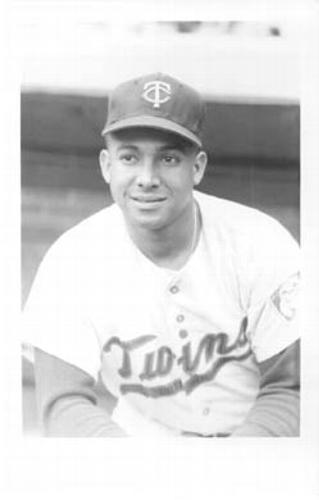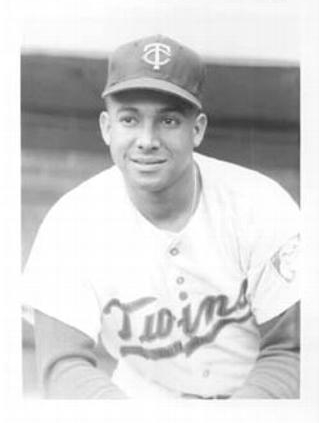June 20, 1961: Julio Becquer hits first pinch-hit and walk-off home run in Minnesota Twins history
 The 1961 American League baseball season ushered in change. The Washington Senators moved to Minnesota, becoming the Twins. It was the inaugural season for two new expansion teams, the Los Angeles Angels and the new Washington Senators.
The 1961 American League baseball season ushered in change. The Washington Senators moved to Minnesota, becoming the Twins. It was the inaugural season for two new expansion teams, the Los Angeles Angels and the new Washington Senators.
Julio Becquer also experienced change as the season got under way. Beginning in 1955, Becquer had played for the Senators. However, on December 14, 1960, the Angels made Becquer the 55th overall pick in the 1960 expansion draft, paying $75,000 for the first baseman. It proved to be a poor investment. Becquer had only eight official at-bats with the Angels. He walked once, had no hits, and struck out five times.
On May 10, 1961, Los Angeles placed Becquer on waivers. The Philadelphia Phillies purchased him and immediately sent Becquer to the Buffalo Bisons, their affiliate in the Triple-A International League. Becquer did not fare much better in Buffalo. He was hitting .150 when his old team (the Washington Senators), now called the Minnesota Twins, purchased him for about $10,000.1 The date was June 2, 1961. The next day, Becquer was in a Twins uniform.
The Twins had a three-game losing streak (they were 24-39) as they prepared to host the 32-32 Baltimore Orioles in Metropolitan Stadium for a three-game series and the start of a 10-game homestand. A total of 17,851 paid to see lefty Jack Kralick oppose Baltimore’s veteran right-hander Hal Brown.
In the first inning, Kralick retired the Orioles in order, but Brown immediately ran into trouble. Billy Martin led off the Twins half of the first with a single. One out later, Harmon Killebrew hit Brown’s first pitch 400 feet over the left-center-field fence for his 17th home run of the year.2 The Orioles got a run back in the third inning. Earl Robinson started things off with a double inside third base. With two outs, Brooks Robinson drove him in with a single to center field.
With the Twins leading 2-1, Brown began the bottom of the third by walking Jim Lemon. Bob Allison followed with a single, putting runners on the corners with no outs. Brown nearly worked his way out of trouble. He retired Dan Dobbek and Earl Battey. But Jose Valdivielso blooped a single over first, scoring Lemon. The Twins had a 3-1 lead after four innings.
The Orioles threatened in the top of the fifth inning but failed to score. With one out, Earl Robinson bunted his way on. Jerry Adair walked. After a double steal, Dave Philley pinch-hit for Brown. Kralick struck him out on a slow curve before retiring Brooks Robinson on a fly out to center.
The score remained 3-1 until the eighth inning. Jack Fisher had replaced Brown for the Orioles. He surrendered a one-out single to Allison, a shot that went off Brooks Robinson’s glove. The hit proved costly. With two outs, Battey’s run-scoring double off Earl Robinson’s glove in deep right-center gave the Twins a 4-1 lead entering the ninth inning.
Three outs away and Kralick pitching well, it appeared as though the three-game losing streak would come to an end. Through eight innings, Kralick had allowed only four hits. But back-to-back singles by Jim Gentile and Gus Triandos opened the ninth. Minnesota manager Cookie Lavagetto went to the mound to speak to Kralick, but the lefty remained in the game. After the mound visit, Ron Hansen lined out to center. Then Earl Robinson, who entered the game hitting .140, got his third hit of the night, a three-run, 390-foot game-tying home run to right field. It was Robinson’s first major-league home run3 and tied the score. Adair singled, and that was all for Kralick. Chuck Stobbs relieved him. He struck out Fisher (trying to bunt), but Brooks Robinson singled, sending Adair to third. Stobbs got out of trouble, inducing Dick Williams to pop out to the catcher.
With the score tied, 4-4, the stage was set. Becquer pinch-hit for Stobbs to open the bottom of the ninth inning. He sent a Fisher curveball 370 feet over the right-center-field screen. It was both the first pinch-hit home run and the first walk-off home run in Twins history. After the game, the jubilant Becquer said, “I go up to hit, not to walk. There is no pressure, because I can usually get a piece of the ball. Tonight I happened to get a bigger piece than usual.”4
Losing pitcher Fisher fell to 2-8. He said, “I’ve faced Julio many times in the last few seasons. I think this was only the second or third hit he’s gotten a hit off me.”5 It was the third time the Twins had beaten Fisher in 1961.
Chuck Stobbs picked up his first win of the season (against two losses). Kralick pitched solid baseball for eight innings. According to the Orioles’ Triandos, Kralick had “great stuff” but “might have tired a little in the ninth.”6 Kralick disagreed. “I felt strong,” he said. “They just started to drop the hits in there. The pitch I threw to Earl Robinson was outside, and he hit it out of the park.”7
Two weeks later, Becquer provided another big moment for Twins fans. In the first game of a Fourth of July doubleheader, the Twins trailed 4-2 in the bottom of the ninth. After two singles and a walk, they had the bases loaded with two outs. Becquer was summoned to pinch-hit for Bill Tuttle, and he electrified the crowd with a walk-off homer into the right-field seats.
Looking back on his career decades later, Becquer said, “I was a fairly good hitter, but I had no power.8 I could hit the ball out once in a while but I was a spray hitter. I was somewhat a small guy for first base; I wasn’t the standard first baseman. I was a great fielder which helped me a lot. I developed a good reputation as a pinch-hitter and that helped me stay in the big leagues.”9
After the 1961 season Becquer thought he was through playing major-league baseball. He spent time in the minors and played ball in Mexico. In 1963 he discovered he was one week short of qualifying for a pension. Twins owner Calvin Griffith placed Becquer on the big-league roster.10 On September 18, he appeared for the last time, running for Battey in the eighth inning.
Sources
In addition to the sources cited in the Notes, I consulted the Baseball-Reference.com, Retrosheet.org, Newspapers.com, and the following:
Beebe, Bob. “‘Dr.’ Becquer’s Serum Saves ‘Snake Bit’ Twins,” Minneapolis Star, June 21, 1961: 1F.
Briere, Tom. “Becquer Blast Propels Twins by Orioles 5-4,” Minneapolis Morning Tribune, June 21, 1961: 21.
Elliot, Jim. “Birds Lose to Twins on Becquer’s Homer in 9th, 5-4,” Baltimore Sun, June 21, 1961: 19.
Swol, John. “Julio Becquer, a Member of 1961 Minnesota Twins Team, Passes Away,” twinstrivia.com/2020/11/06/julio-becquer-a-member-of-1961-minnesota-twins-team-passes-away/.
baseball-reference.com/boxes/MIN/MIN196106200.shtml
retrosheet.org/boxesetc/1961/B06200MIN1961.htm
Notes
1 Some reports say the Twins paid Buffalo $20,000 for Becquer. See Sid Hartman (Hartman’s Roundup), “Mele Corrected Becquer’s Style,” Minneapolis Morning Tribune, July 5, 1961: 20.
2 Killebrew finished the 1961 season with 46 home runs.
3 Earl Robinson finished the season with eight home runs. He hit 12 home runs during his four-year major-league career.
4 Dwayne Netland, “Becquer Scored on Rebound,” Minneapolis Morning Tribune, June 21, 1961: 21.
5 Netland.
6 Netland.
7 Netland.
8 Becquer hit five home runs in 1961. He hit 12 home runs during his seven-year big-league career.
9 Nick Diunte, “How Julio Becquer Linked the Cuban Legacy of the Washington Senators and Minnesota Twins Franchises,” November 3, 2020. forbes.com/sites/nickdiunte/2020/11/03/how-julio-becquer-linked-the-cuban-legacy-of-the-washington-senators-and-minnesota-twins-franchises/.
10 Diunte.
Additional Stats
Minnesota Twins 5
Baltimore Orioles 4
Metropolitan Stadium
Bloomington, MN
Box Score + PBP:
Corrections? Additions?
If you can help us improve this game story, contact us.


